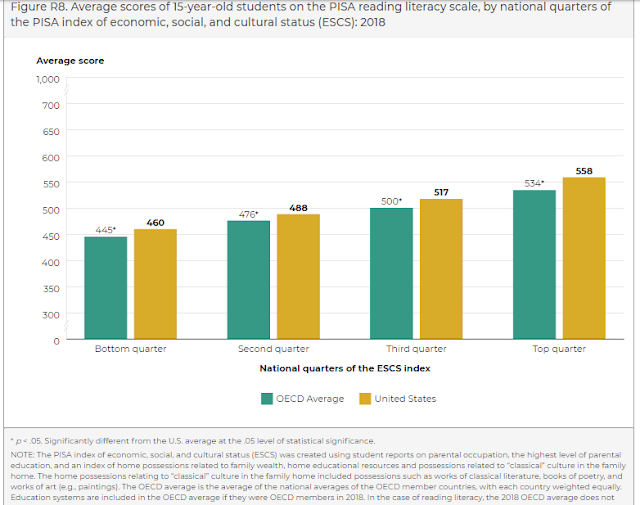The latest PISA scores have been released and edu-pundits are clutching their pearls because "our scores are terrible." Yet hardly anyone has mentioned that, just like in the past, the scores in the US are lower than many others in the OECD because the US has a high rate of child poverty.
I wrote about this after the last release of PISA scores...
The problem that DeVos and others don't understand, or just simply ignore, is poverty. American public schools accept everyone and test everyone. Not all countries do that. We don't weed out our poor and low-achieving students as they get older, so everyone gets tested. To be fair, Secretary DeVos might not know this. She never attended a public school and never sent her children to public schools. In her experience, children who weren't achieving academically might have been weeded out of her private schools. She probably never realized that they were then sent to public schools, where all students are accepted.North Carolina blogger Stu Egan (Caffeinated Rage) did notice it this time and posted...
The fact is that students who come from backgrounds of poverty don't achieve as well as students from wealthier backgrounds. And we, in the U.S. are (nearly) Number One in child poverty.
Poverty Affects Schools, No Measurable Differences in 15 Years, And Reforms Have Not Worked: What The PISA Scores Show Us
What DeVos got wrong is that we as a country are not average. We actually do very well when one considers the very things that DeVos is blind to: income gaps, social inequality, and child poverty.Egan posted these graphs (along with others) from the latest PISA tests. They show that, within each quartile of the PISA index of economic, social and cultural status, the US scores are near the average for the rest of the OECD. Check out his entire post.
In reading, the US 15-year-olds scored a little above the OECD average at each quartile.
In math, the US 15-year-olds scored slightly below the OECD average at each quartile.
We're not number one. But we're not "failing" either. If our child poverty rate was lower, we wouldn't have so many more scores in the lower quartiles and our average scores would be higher.
Egan also includes a long quote from the Economic Policy Institute (from an earlier version of the PISA) which explains things very well. Here's part of it...
What do international tests really show about U.S. student performance?
Because social class inequality is greater in the United States than in any of the countries with which we can reasonably be compared, the relative performance of U.S. adolescents is better than it appears when countries’ national average performance is conventionally compared.We won't be able to climb to the "top" of the PISA rankings as long as we are near the "bottom" of the OECD in child poverty. What we've been doing has actually been making things worse.
- Because in every country, students at the bottom of the social class distribution perform worse than students higher in that distribution, U.S. average performance appears to be relatively low partly because we have so many more test takers from the bottom of the social class distribution.
- We spend too much time on testing and not enough on teaching.
- We divert too much of our education funding to the privatization of public schools instead of supporting the common good.
- We're so focused on cutting taxes for the wealthy that we don't have enough money to support our future.
In his Southern Christian Leadership Conference Presidential Address, on August 16, 1967, Martin Luther King Jr. said,
...we are likely to find that the problems of housing and education, instead of preceding the elimination of poverty, will themselves be affected if poverty is first abolished.
🚌📚📝




No comments:
Post a Comment